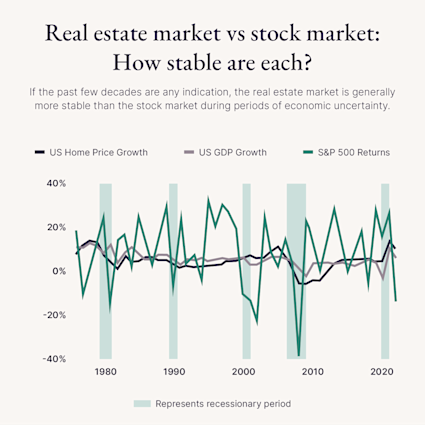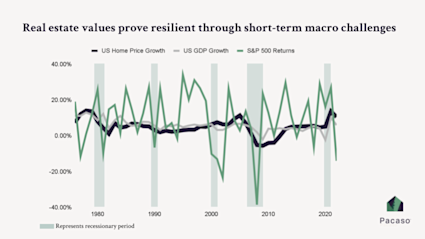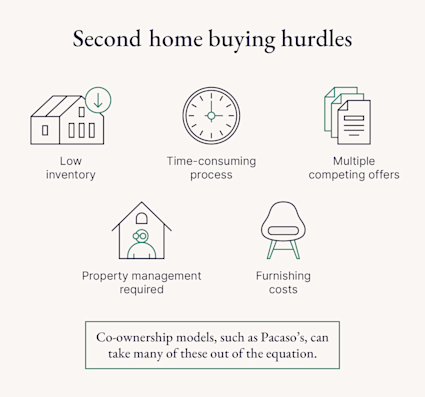Would I be better off purchasing real estate or investing in the stock market?


What are you seeing in the real estate market today?
This is not 2008.² Currently, real estate remains robust as demand, tight inventory and supply chain constraints on labor and raw materials continue to define the market.³ The current low likelihood of a recession also offers an optimistic outlook for real estate.Will rising interest rates impact sales?
Reports suggest a return to more normalized transaction levels and timing due to a combination of high interest rates and low inventory.⁴ Should that occur, we believe Pacaso offers a unique solution to customers because interest rates impact co-ownership less than whole home ownership, as the purchase price is proportionally smaller. Combined with lower overall costs, co-ownership is the more financially responsible purchase than a traditional second home. Our latest data shows more than 21% growth in co-ownership across the U.S. Additionally, Pacaso allows customers to avoid fierce competition over low inventory. In our report, the 10 regions with the highest co-ownership growth also have noteworthy year-over-year growth in home prices. Both high rates and home prices in the market are establishing co-buying solutions as the norm in real estate.What if I want to purchase real estate partly as a hedge against instability in the wider economy?

What if I buy now and need to sell during this economic cycle?
Again, we can’t predict the future, but history shows that the real estate market will remain stable. Should you want to sell in this economic cycle, Pacaso offers a seamless resale process. Pacaso units have historically resold, on average, for a 10% gain. Additionally, 25% of resales are purchased by other owners of the same Pacaso who wanted to increase their ownership.1. For this analysis we looked at numerous publicly available datasets covering various economic signals — including GDP growth, housing price data and stock market data — to study the effect economic cycles have on different asset classes in the United States. We looked at year-over-year returns for the following indexes: US Home Price Index, US GDP Growth, S&P 500 Returns, Dow Jones Returns and Top-Tier Real Estate Home Value Index. 2. Zillow Research on June 7, 2022. (2022, June 7). Housing market hot but not a bubble, economists say. Zillow Research. Retrieved June 17, 2022, from https://www.zillow.com/research/zhpe-q2-2022-not-a-bubble-31093/ 3. Speianu, S., & Hale, D. (2022, June 1). May 2022 housing market trends report, Realtor.com Economic Research. Retrieved June 16, 2022, from https://www.realtor.com/research/may-2022-data/4. Nicole Bachaud on May. 19, 2022. (2022, June 1). The housing market is as competitive as ever despite soaring costs (April 2022 market report). Zillow Research. Retrieved June 17, 2022, from https://www.zillow.com/research/april-2022-market-report-31040/









